Homemade Laundry Detergent
Learn how to make homemade laundry detergent with this simple and natural tutorial. Natural, DIY laundry detergent is really inexpensive, and healthier for your family than most conventional options. See my tips below when using this natural recipe.
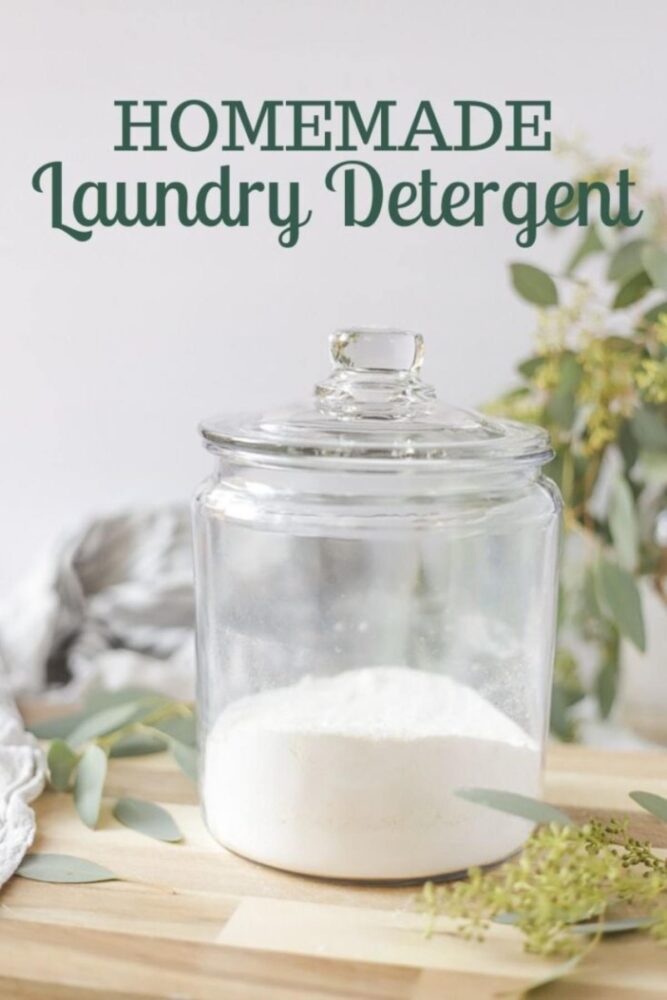
Are you still spending a small fortune on store-bought laundry soap to find out they are loaded with tons of artificial ingredients?
Have you ever thought of embracing a more natural lifestyle while keeping a few extra dollars in your wallet? I’ve got you covered!
This DIY laundry detergent recipe is an absolute game changer. Not only will it transform your laundry routine, but it will also redefine how you approach cleanliness.
I started making my own laundry detergent a long, long, long time ago. Since I talk about it a lot (and I do mean a lot), I get so many questions about it.
So I thought it may be a good idea to write a post about it and answer all the questions you may have ever had. This was also really fun to write because I love the product and can speak from experience. I really enjoy helping people to see and choose healthier alternatives that aren’t incredibly inconvenient.
This recipe is super fast, super simple, and super cheap (around 1-2 pennies a load)! For comparison, typical detergents are around $0.28 to $0.30 a load (huge savings, am I right?).
I am a big fan of homemade cleaning products for this reason. I’m saving money, I’m saving some time, and I’m able to choose ingredients that I can feel good about.
Since I already make all our other cleaners, from furniture polish to glass cleaner, all-purpose cleaner to even the dreaded toilet cleaner, I thought why not make something that is natural and cleans our clothes?
When I first started making my own homemade laundry detergent so many years ago, there were basically no natural alternatives available. This was one of the things that got me thinking that I should attempt my own. Simple, natural, and cost-effective — that’s basically my motto.
Thankfully, nowadays there are many more options available. Sometimes life gets busy, we are traveling, working, and just forget to make our own. I know how it goes! So I included a handful of detergent options that you can purchase below — that are still on the natural side of things.
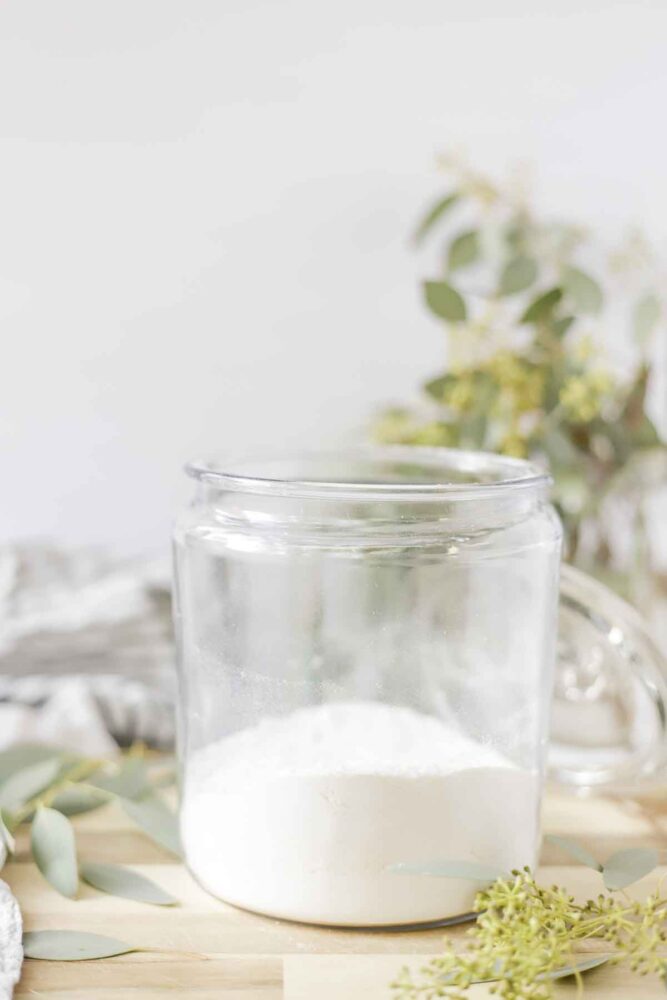
Tips For Homemade Laundry Detergent:
- If you find your laundry detergent is not dissolving well for you, there are a couple of simple things you can try. First, try washing the clothes in warm or hot water, as the heat can help the dissolving process. Another option would be to pre-dissolve the detergent in hot water before adding it to your load of laundry.
- Use laundry balls as a natural fabric softener alternative. Laundry balls help air circulate in the dryer by separating tumbling clothes and working to prevent wrinkles. The contact the dryer ball makes with the clothes naturally softens them, leaving you with a pleasant and gentle feel. If you’re set on scented laundry, you can experiment with adding a few drops of essential oils to the wool dryer balls when you toss them in.
- You can add a bit of vinegar to the load, which also can soften clothes. Vinegar is a natural cleaning agent that deodorizes and removes stains. It is also eco-friendly and doesn’t harm your washing machine.
- To help tackle tough stains, you have got to try my DIY Stain Remover. It is really effective for stain removal! Whether it’s grass, coffee, wine, or grease, this homemade stain remover has consistently impressed me. A good stain remover truly makes one feel like a successful adult. You know, one of those little tips you can pass down to your kids one day. Far off in the future, of course.
- Keep in mind that I’ve personally used this recipe for years, and while it has been successful and worked lovely for us, it may not work perfectly for you. Different water quality may impact its performance. If this is a challenge for you, experimenting with additives and water temperature might be helpful. Some find it useful if they add a tablespoon or two of Dr. Bronners Sals Suds. This can provide an extra cleaning boost and help remove any buildup people might experience.
The following are affiliate links. We are a participant in the Amazon Services LLC Associates Program, an affiliate advertising program designed to provide a means for us to earn fees by linking to Amazon.com and affiliated sites.
Tools you will need:
Measuring cup
Storage container – I found the one used above at a thrift store for cheap.
Wool dryer balls – this is a great switch for those who want to use a something natural for fabric softener.
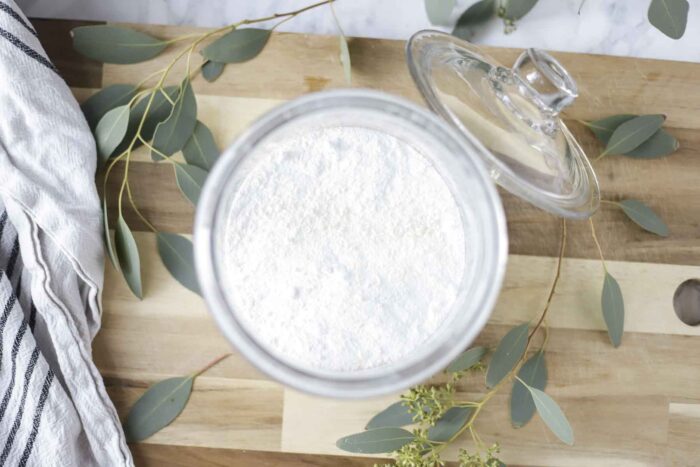
FAQ
Why would you want to make the switch to natural laundry detergent?
Everyone loves the smell of some good, fresh laundry, but not everyone is aware of what exactly that good smell means. You know how that freshly-laundered-clothes smell lingers for days?
It is tempting to think that aroma is associated with cleanliness, but most commercial detergents achieve their smell through a mix of synthetic ingredients or “fragrance”.
What do I mean by “fragrance”? Good question! I’m not talking about how something smells, but more so referring to “fragrance” as an ingredient.
“Fragrance” is a mix of complex chemicals that produce a certain smell. When it shows up on an ingredient list, it is a general term for hundreds of potentially toxic chemicals. Many of these synthetic chemicals are endocrine disruptors and can be carcinogenic.
The good news is that you don’t need fragrance for a functional and effective product. Plus, you can usually opt for natural fragrances like essential oils.
So, when you are using commercial laundry detergents, you are not simply washing clothes. You’re wearing those synthetic fragrances all day long. Being exposed to these fragrances in our homes, laundry, and environments can pose long-term health effects.
The benefits of making your own detergent are pretty significant. You get to see what ingredients are going into your product while saving money.
This can help limit your family’s and your exposure to harmful chemicals. Homemade detergents present a powerful solution to consumers that are looking for an eco-friendly, cost-effective, and HE-safe option. Achieving fresh, naturally-clean laundry can be easy and budget friendly.
Is homemade laundry detergent HE safe?
Yes! One of the main considerations when choosing a detergent that is safe for HE washers is the production of suds. Laundry detergents compatible with HE washers are formulated to produce a minimal amount of suds, while traditional detergents can create excessive sudding.
There are some key differences between high-efficiency washers and conventional washers that make your laundry detergent selection important. HE washers spin at a higher speed than conventional washers.
They clean clothes by tumbling or spinning more during the wash cycle. They are considered highly efficient because they draw less water and energy, by optimizing how it senses fabrics and load size.
Instead of using an agitator to spin the clothes, the high-efficiency washer utilizes the movement of clothes against each other. A lot of movement goes on in these washers with a lot of spin.
I imagine you can see the problem with excessive sud-producing detergents at this point. This can lead to issues like residue buildup due to poor rinsing, which may cause damage to your machine.
Fortunately, homemade detergents are formulated with low-sudsing ingredients. This homemade detergent utilizes those ingredients with low sudsing properties, assuring that it is totally safe for high-efficiency washers.
Not only that, but it also offers a ton of additional benefits. Homemade detergent effectively tackles stains and dirt while being gentle on fabrics. It also reduces the risk of residue buildup in your washer.
Don’t know if your washer is HE or not? There are a few markers to look out for. HE washers are usually clearly labeled, which makes them easy to identify.
Most front-loading machines are designed to be high-efficiency. Another dead giveaway is that it won’t have an agitator like most traditional washers.
Can I use baking soda instead of washing soda?
No! Despite how similar they look, they are completely different products with their own unique compositions.
Washing soda, also known as sodium carbonate, is different from baking soda, also known as sodium bicarbonate. Clear as mud? It is a totally natural product.
Washing soda boasts cleaning capabilities due to its alkaline nature. The alkalinity makes it a staple addition to many laundry products.
It is effective at removing stains and brightening clothes. Washing soda softens hard water and controls pH levels.
Baking soda is also a natural product, but has a different purpose. Although it can not be a substitute for washing soda, it can be beneficial to add to your laundry.
You can add it on top of the ingredients in this recipe to boost whitening, reduce odors, and help soften fabrics. Baking soda also has the ability to regulate the pH level in your washer from being too acidic or alkaline.
If you find youself in a positon without washing soda on hand, you can actually make washing soda out of baking soda!
By using both baking soda and washing soda, you can maximize how effective your detergent will be.
Is borax safe to use in homemade laundry detergent?
Borax is scientifically known as sodium tetraborate. It is a powdery substance widely used as a household cleaner. It is a natural ingredient made up of sodium, boron, oxygen, and water.
Discussions concerning the safety of borax have become common, primarily around ingestion risks. Since it is used to wash clothes, you are not ingesting it, and it is rinsed out, it should not be of concern.
Just make sure to take proper precautions when handling this product. If you are looking to further understand the safety of borax, You can read all about that here.
Can I add essential oils to my laundry detergent?
From my personal experience, I haven’t found much benefit in adding essential oils to my laundry detergent. Although the use of essential oils for adding scent to laundry is a question that is often asked, I find it somewhat useless.
Even though I don’t regularly add essential oils to my detergent, I do recognize how beneficial they are for someone looking for a way to achieve a natural scent.
If you are interested in experimenting with this idea, a common method is to add a few drops of essential oil to a dryer ball before adding it into the dryer.
How do you make liquid laundry detergent?
This recipe is very similar, but it results in a liquid form. You’ll be using the same ingredients with some adjustments to the process.
What about natural fabric softener?
We have talked a lot about the natural benefits of homemade laundry detergent, but not much about fabric softener. Similar to commercial detergent, commercial fabric softener often contains the same harsh chemicals.
The solution is pretty simple. You can replace fabric softener with vinegar. Over time the use of fabric softener can build up in your machine.
Vinegar not only softens your clothes but can help fight buildup in your washer. If you don’t want to use vinegar but are still looking for natural fabric softener options, I will list some below.
Where do I get the ingredients?
- Washing Soda – This can be found at many grocery stores in the laundry aisle. It can also be found online, so you don’t even have to leave the comfort of your home.
- Borax – Find this also in the laundry aisle at grocery stores and big box stores. Even Lowe’s and Home Depot carry borax.
- Castile soap or Fels Naptha soap bar – Dr. Bronner’s makes an unscented castile soap bar, which can be found at many big box stores. You can find the Fels-Naptha bar in the laundry aisle of most stores.
If you don’t live close to somewhere that would carry any of these ingredients, they can be found online!
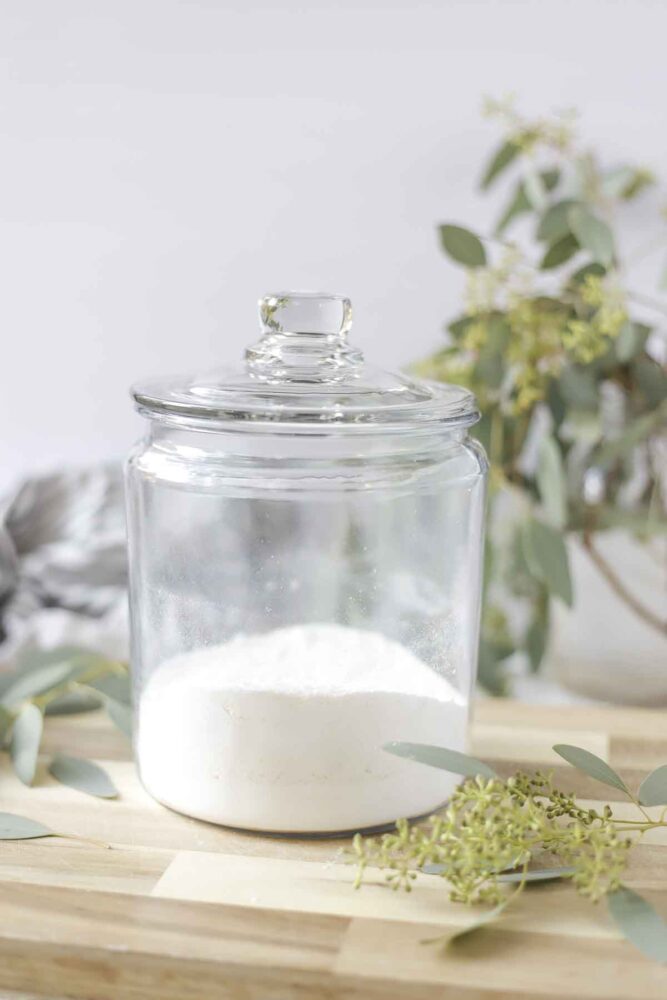
My recommendation for natural store-bought laundry detergent:
Not everyone wants to make laundry detergent, and I truly get that. There are still options for you to live a natural, clean, healthy lifestyle. One way to guarantee your product is safe is by checking it on the EWG website. A lot of products on the market were made decades ago and contain chemicals that we knew very little about.
Nowadays scientists have found links to cancer with some of these chemicals. In response, The Environmental Working Group formed in 1993 to track the chemical safety of products. It has become a go-to resource for consumers looking for healthier options.
Here are some of the brands I would recommend that have a good rating on the EWG website:
- Ecover – Gets an A from EWG and works great. We use this often when we run out of homemade laundry soap and I haven’t made a new batch.
- EverSpring Free And Clear – We used this once on vacation and it seemed to work really well.
- Branch Basics – This is a little pricey up front, but this natural cleaner isn’t exclusive to the laundry room. It can also be used in the kitchen or bathroom, and it is one of the best cleaners I’ve ever used.
- Country Save
- Ecos
Ones I have not personally tried but have good ratings:
- Aspenclean
- Attitude
- Common Good, unscented
- Seventh Generation Laundry Detergent Powder Free And Clear
- Planet 2x
Fabric softeners with good ratings:
- 9 Elements Purifying Softener
- Attitude
- Dropps Fabric Softener Pods
- Truly Free
- Clean People Fabric Softener
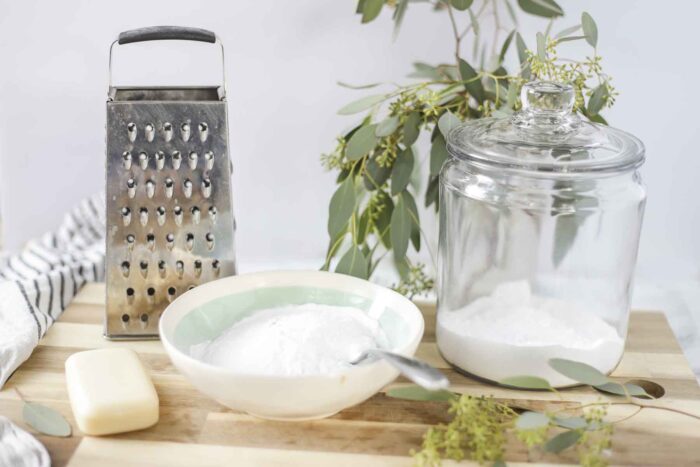
Homemade Laundry Detergent Ingredients
- Borax is alkaline, making it a great tool for fighting acidic stains (ex. tomato, wine, coffee). It also helps make white clothes whiter while neutralizing odor.
- Washing soda – Washing soda is especially great for areas with hard water. It helps soften water, remove stains, and eliminate odors.
- Bar of soap – Unscented castile soap bars are my personal preference. It is a great option for those who struggle with sensitive skin and have a preference for sticking with natural ingredients. The Fels-Naptha soap bar is a common choice for many homemade laundry detergents. However, it does contain artificial fragrances, so I personally choose not to use this.
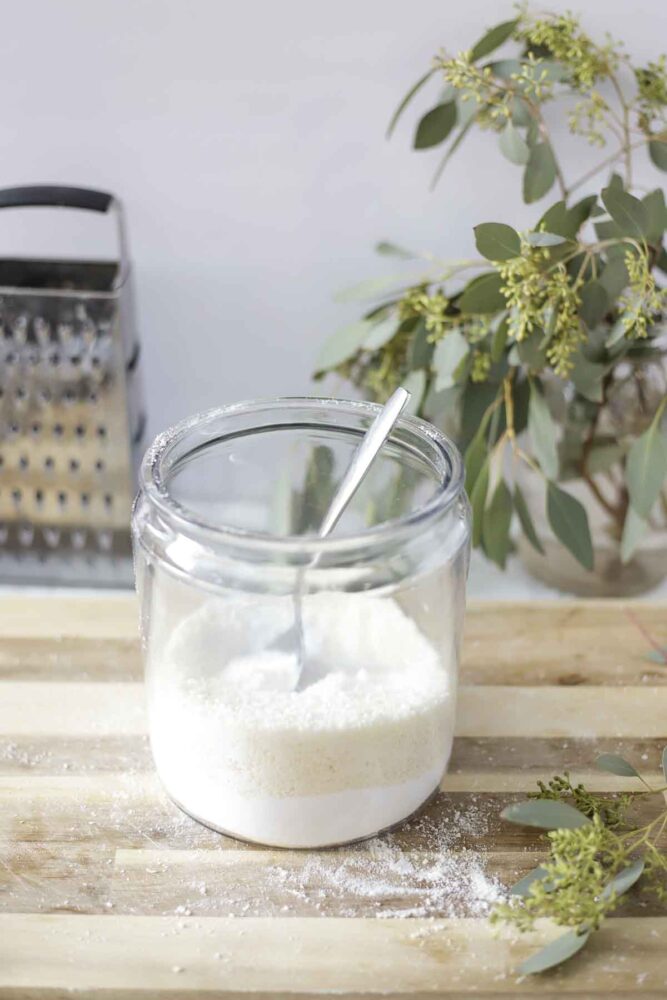
How To Make Laundry Detergent
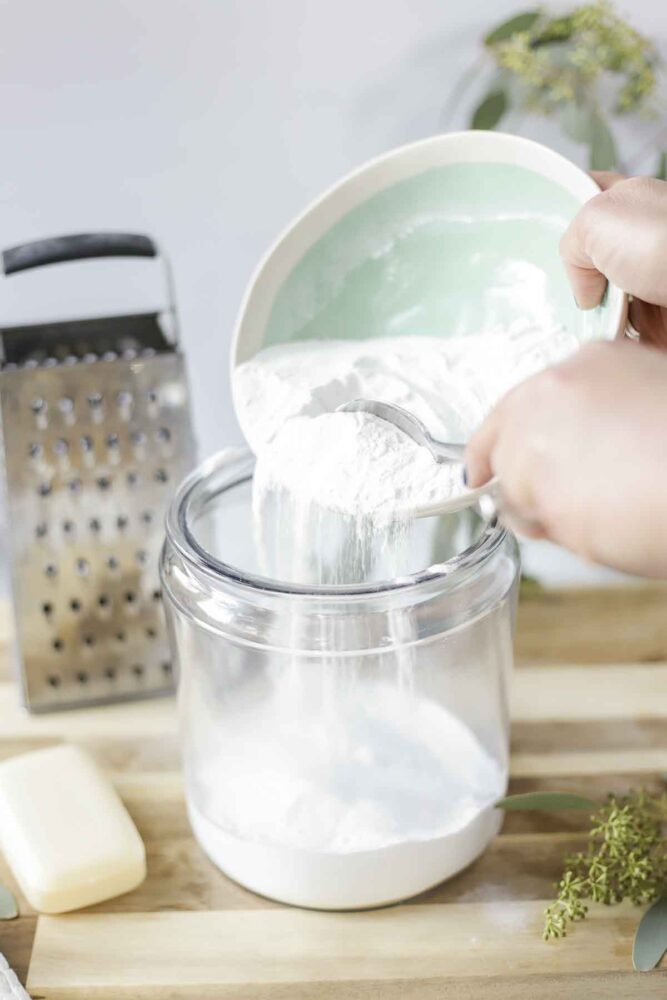
Mix borax and washing soda in your storage container.
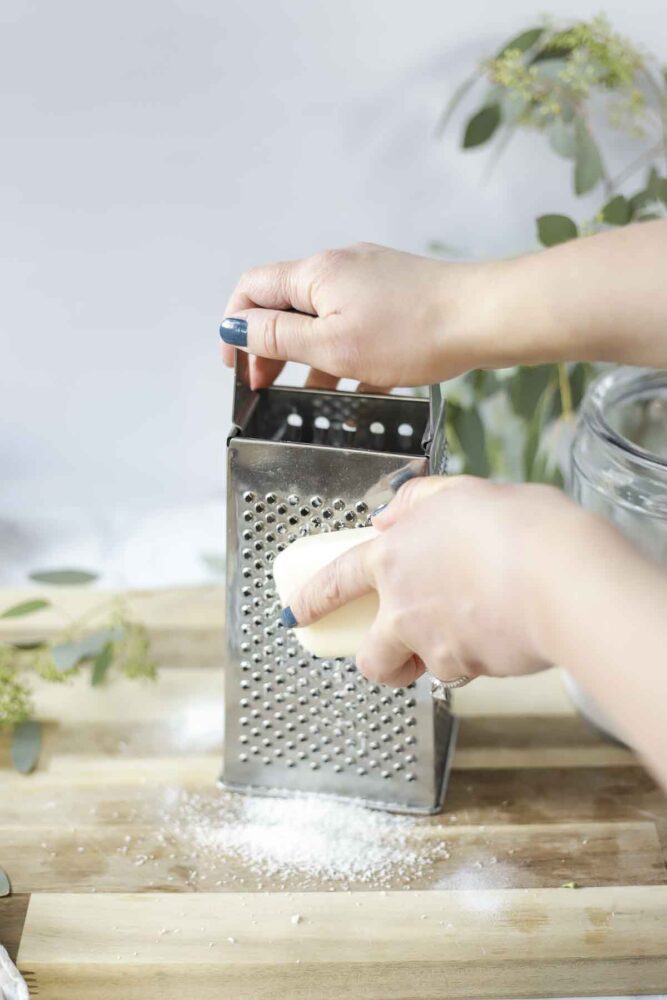
Grate the bar of soap with a fine cheese grater.
Add the grated soap to the container and mix.
Optional step: if you want a finer texture, you can run the mixture through the food processor or blender.
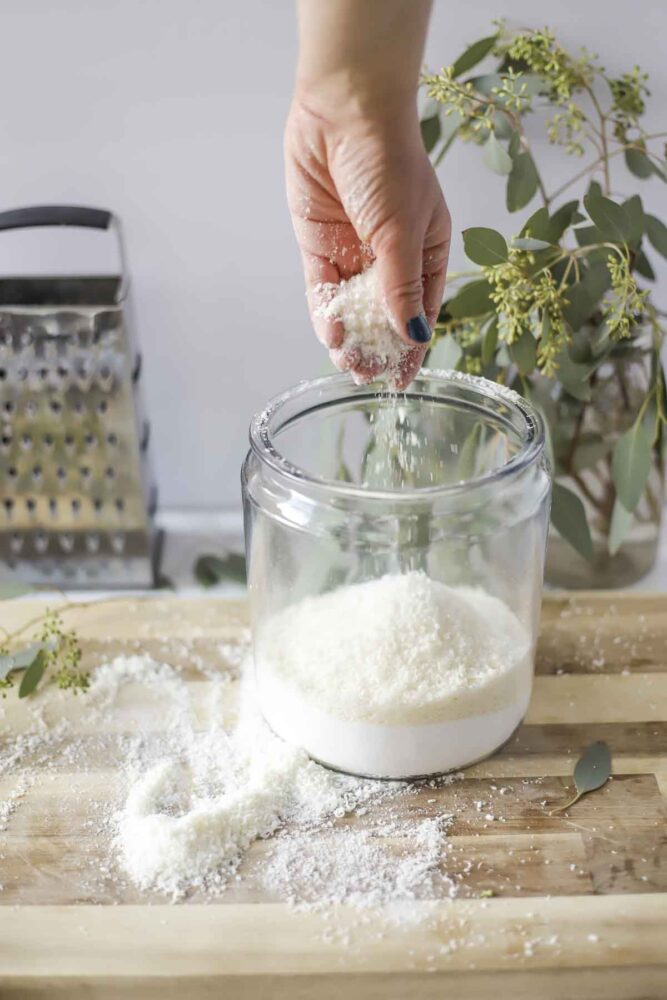
How To Use
Add 1-2 tablespoons of detergent to each load of laundry.
I only use cold water to wash my clothes because it helps save energy, and I haven’t had any issues with finding undissolved detergent.
However, this is a common complaint, to which there are some possible solutions. Using warm water may help, as it aids in the dissolving process. Another option may be to dissolve the detergent in hot water before you add it to the washing machine.
If you are the liquid kind of guy or gal, here’s a recipe for liquid laundry detergent. It is very similar to this recipe, but a bit different in process.
Find More Of My Favorite DIY Natural Home Cleaning Products:
- Natural Homemade Glass Cleaner
- DIY All-Purpose Cleaner – Works on Glass
- Homemade Toilet Bowl Cleaner – 2 Natural Recipes
- Homemade Air Freshener – Natural Room Spray
Want a printable version so you always have it on hand? Find it below. If you try it and love it, make sure to come back and give it 5 stars. Please and thank you.
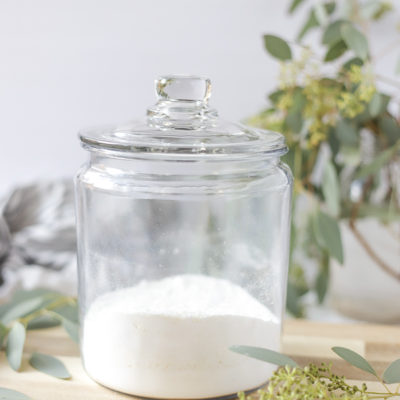
Homemade Laundry Detergent
Equipment
- Cheese Grater
Ingredients
- 1 cup washing soda
- 1 cup borax
- 1 bar natural bar soap
Instructions
- Grate bar of soap with fine cheese grater.
- Mix in borax and washing soda. Stir well.
- Optional step: if you want a finer texture, you can run through the food processor or blender.
To Use:
- Add 1-2 tbs of detergent to each load.
Notes
- If you find your laundry detergent is not dissolving well for you, there are a couple of simple things you can try. First, try washing the clothes in warm or hot water, as the heat can help the dissolving process. Another option would be to pre-dissolve the detergent in hot water before adding it to your load of laundry.
- Use laundry balls as a natural fabric softener alternative. Laundry balls help air circulate in the dryer by separating tumbling clothes and working to prevent wrinkles. The contact the dryer ball makes with the clothes naturally softens them, leaving you with a pleasant and gentle feel. If you’re set on scented laundry, you can experiment with adding a few drops of essential oils to the wool dryer balls when you toss them in.
- You can add a bit of vinegar to the load, which also can soften clothes. Vinegar is a natural cleaning agent that deodorizes and removes stains. It is also eco-friendly and doesn’t harm your washing machine.
Happy saving money! Be joyful on laundry day 🙂
-Amy
This post was originally published in October 2011 and was updated April 2024.


I love the jar you use.any idea were I could find something like it?
My husband found me a big ball jar at an antique store. Also, Ive seen the really big ones at antique stores, estate sales, and brand new ones at Hobby Lobby!
Thank you
Where could I find borax?
You can find it in the laundry aisle. At our Walmart it is near the dryer sheets and by the washing soda and felsnapa soap!
Can this be used in HE?
Amy I believe so. I do not have a HE washer but I have heard of others use it that do have one! Lots of other blogs I have seen say its HE safe! Have a great day!
I use it in my HE and it works great! Hardly any suds and cleans like a charm! LOVE IT!
Great I thought so! Thanks for confirming!!! and I’m glad you like it!
Is that one cup of washing soda or one box? Your recipe just says 1 washing soda.
I love this we have been using it awhile. Once in a while I throw in extra washing soda and a bit of hyrogine peroxide let it wash for a few and soak awhile. It helps get any residue and just brightens up. Great for towels. Vinegar to rinse heaven!
OO thats a great tip thanks for sharing! I have heard that hydrogen peroxide works just havent tried it yet!
Is it 1 cup of washing soda?
O my gosh I never realized that sorry its 1 cup!
Is the 1-2 tbs really enough for a large load? Its usually 1/2-1 cup?? What is the vinager rinse..wanting to try making this week..also when do you use and why peroxide? ?
Thanks
Yep because its really concentrated. Vinegar rinse is when you add a little bit of vinegar during the rinse cycle. The only thing I use peroxide for right now is whitening my teeth not for laundry 🙂
Can you add essential oils to the mixture?
Yes!